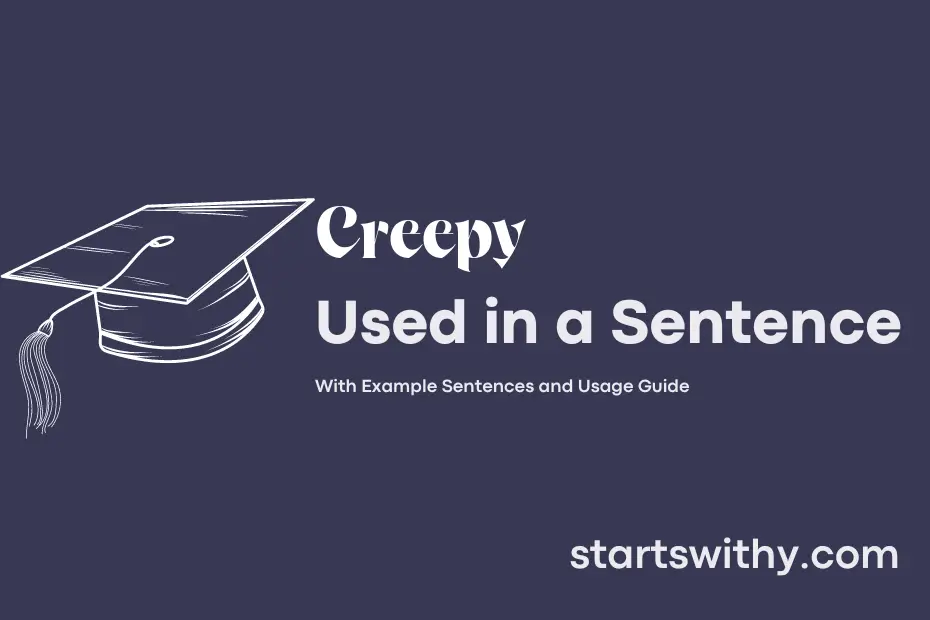Do you ever encounter a sentence that sends shivers down your spine? When a sentence gives off a sense of unease or fear, it can be described as “creepy.” Creepy sentences have the power to evoke feelings of dread or discomfort in the reader, often through unsettling or eerie descriptions.
These sentences may contain elements of horror, the supernatural, or simply be crafted in a way that triggers an unsettling feeling. Through the use of vivid imagery, unexpected twists, or chilling implications, creepy sentences can linger in the mind long after they are read. Let’s explore the art of creating such sentences and analyze what makes them truly spine-chilling.
7 Examples Of Creepy Used In a Sentence For Kids
- The creepy spider crawled along the wall.
- The old house looked creepy at night.
- The creepy sound in the forest scared me.
- The creepy mask made me jump.
- I saw a creepy shadow in the dark.
- The creepy Halloween decorations gave me goosebumps.
- The creepy ghost costume was spooky.
14 Sentences with Creepy Examples
- Creepy noises coming from the empty classroom gave me shivers.
- The old library with dim lighting had a creepy vibe to it.
- Walking alone on the deserted campus at night felt creepy.
- The strange old man lurking around the hostel was definitely creepy.
- That abandoned building on the outskirts of town looked really creepy.
- The eerie silence in the lecture hall felt quite creepy.
- The way that guy stared at me in the cafeteria was really creepy.
- Finding a mysterious note on my desk was quite creepy.
- The flickering lights in the corridor made the hallway seem even more creepy.
- Watching horror movies at midnight made the hostel room feel creepy.
- The haunted house on campus was rumored to be extremely creepy.
- The sudden drop in temperature during summer felt strangely creepy.
- The distorted mirrors in the dance studio gave off a creepy effect.
- The secret passageways in the old building were definitely creepy.
How To Use Creepy in Sentences?
Creepy can be used in a sentence to describe something unsettling, eerie, or causing a feeling of fear or unease. When using the word “creepy,” it is essential to consider the context in which it is being used. Here is a helpful guide on how to incorporate “creepy” into a sentence:
-
Adjective: Creepy is an adjective, which means it is used to describe a noun. For example, “The abandoned house had a creepy atmosphere.”
-
Subject-Verb-Object: Remember to use creepy after the subject and verb when constructing sentences. For instance, “She felt creepy walking through the dark forest alone.”
-
Interjections: You can use creepy as an interjection to express your feelings of fear or unease. For example, “That doll looks creepy!”
-
Context: Consider the setting and the tone of your sentence when using the word creepy. Make sure it accurately conveys the unsettling or eerie feeling you want to describe.
-
Examples: To get a better understanding, read examples of how others have used “creepy” in sentences. This will help you see the word in various contexts.
By following these guidelines and practicing using the word creepy in different sentences, you will become more comfortable incorporating it into your vocabulary to effectively describe unsettling or eerie situations.
Conclusion
In conclusion, the diverse examples of sentences with “creepy” illustrate the wide range of situations and feelings associated with this unsettling term. From haunted houses and eerie whispers to strange encounters and spine-chilling tales, the word “creepy” evokes a sense of unease and fear. It can describe anything that causes discomfort, fear, or an uncanny sensation, making it a versatile word in capturing unsettling experiences.
Ultimately, whether it’s used to describe a chilling atmosphere, a creepy character, or an eerie event, “creepy” effectively conveys the sense of unease and dread that often accompanies the unknown or mysterious. It serves as a powerful descriptor for anything that elicits a shiver down the spine or a quickened pulse, highlighting the nuanced and evocative nature of language in capturing the essence of all things eerie and unsettling.



